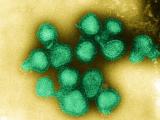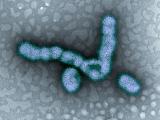May 21, 2009 (CIDRAP News) – In a search for factors that may give some patients a protective edge against novel H1N1 influenza, researchers said today that adults, especially those older than 60, appear to have some cross-antibody response but that seasonal influenza vaccines appear unlikely to offer any protection.
The findings, from scientists at the US Centers for Disease Control and Prevention (CDC) appear in tomorrow's edition of Morbidity and Mortality Weekly Report (MMWR). Results are based on microneutralization and hemagglutination inhibition assays on child and adult serum specimens that were used in previous vaccine studies by the CDC as well as its academic and industry partners.
Epidemiologic patterns in the novel flu outbreak have consistently shown the disease taking its hardest toll on younger people—in the United States, 64% of the novel flu cases have occurred in the 5- to 24-year-old age-group. Officials have wondered if older people haven't yet been exposed to the strain in the community or if another factor, such as preexisting immunity, is providing some protection against the virus. Only 1% of cases have occurred in people over age 65.
Researchers assessed cross-reactive antibody levels to the novel influenza H1N1 virus in cohorts of children and adults before and after they had been vaccinated with a seasonal flu vaccine during any of the past four seasons.
Before vaccination, children showed no cross-reactive antibody reaction to the new flu strain. However, the antibody was detected in 6% to 9% of adults ages 18 to 64 and in 33% of those older than age 60.
Vaccination with any form of the seasonal flu vaccine did not provoke a response to the novel strain in children. Adults ages 18 to 64 who had been vaccinated showed a slight response to the new strain: a twofold increase compared with 12-fold to 19-fold increases seen against the seasonal H1N1 strain. No increase in cross-reactive antibody response was seen in people over age 60 who had been vaccinated.
"These data suggest that receipt of recent (2005-2009) seasonal influenza vaccines is unlikely to elicit a protective antibody response to the novel influenza A (H1N1) virus," the CDC reported.
Though the number of sera samples from children was small, the findings suggest that US children are serologically naive to the new virus, the researchers concluded. However, the analysis suggests adults—especially those older than 60—have some degree of preexisting immunity to the novel strain.
Anne Schuchat, MD, interim deputy director for the CDC's science and public health program, today at a media briefing urged caution in interpreting the results. Cross-reactive antibody assessment is an indirect measure of immune response, and though the findings are interesting, they're not definitive, she said. "The laboratory findings we're reporting seem to correlate with the epidemiologic data that we have so far."
Another reason to not over-interpret the results, she said, is that the microneutralization assay was used as a surrogate and isn't the standard test the CDC uses against influenza viruses. (Microneutralization assays appear more sensitive, but researchers have not agreed on clinical correlates for the method.) She also said the study findings are based on relatively small numbers of patient serum samples.
The response in older people could be explained by exposure to a related virus, exposure to a seasonal flu vaccine that provided protection, or that immune response to the new virus might be similar to that of other viruses, Schuchat said. However, she added that CDC virologists have compared the novel strain with past viruses and found that the new one is very different. "It's not a close genetic match," she said.
She also said experts aren't very impressed by the prevaccination-to-postvaccination ratio of 2:1 that suggests a weak response to the new virus. "That's pretty wimpy," Schuchat said, adding that the ratio for seasonal flu vaccines ranges around 12:1. "Wouldn't it be great if there was boosting? But we don't think we have sufficient evidence of that at this point," she said.
CDC. Serum cross-reactive antibody response to a novel influenza A (H1N1) virus after vaccination with seasonal influenza vaccine. MMWR 2009 May 22;58(19):521-4 [Full text]
See also:
May 6 CIDRAP News story "Fewer senior swine flu cases may hint at protection"
















